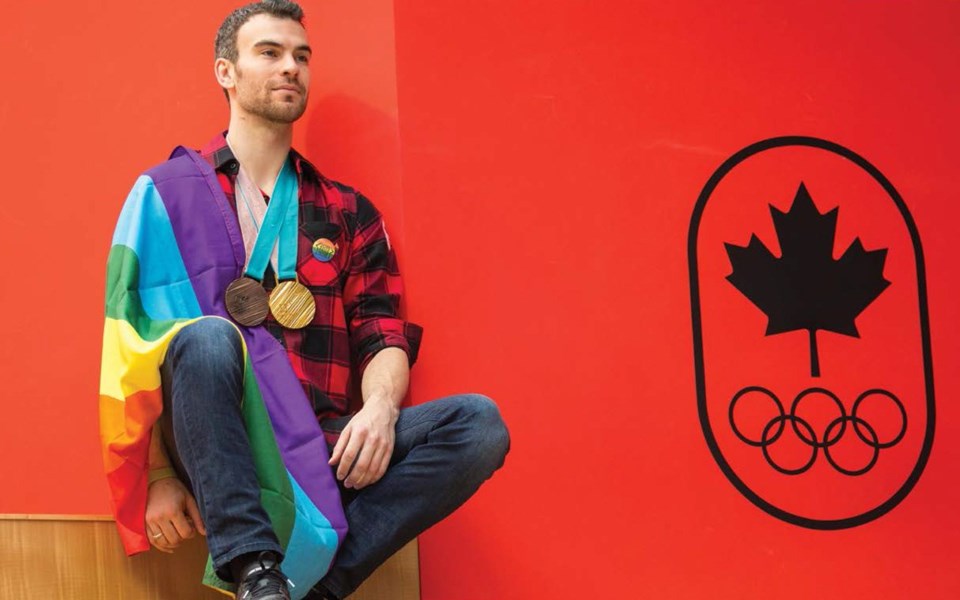You could forgive Photi Sotiropoulos for becoming "a bit blasé" after leading 200 or so media tours of Canada House at this year's Winter Olympics in PyeongChang, South Korea. But that changed one day near the end of the Games when the head of communications for the Canadian Olympic Committee (COC) was touring an American journalist around Pride House, the LGBTQ safe space that was housed in Canada House this year for the first time.
"I turned around at one point and saw him in tears. I asked him if he was OK. He said, 'This is really something special. It's amazing what you guys have done.' It hit me right there," Sotiropoulos recalled. "That moment, that effect it had on people, shouldn't be lost on me. I think that's the true power of Pride House."
Launched in Whistler at the 2010 Olympic Games, Pride House International was scrambling to find a venue in Korea when the COC offered to set aside a corner of Canada House to host the open-access safe space, the first national Olympic committee to do so.
"It was wonderful to see the Canadian Olympic Committee and Canada House really embracing diversity and being a champion at the Olympics," said Whistler's Dean Nelson, the founder of the Pride House movement and Whistler Pride CEO.
The move gave LGBTQ athletes and their loved ones both a physical and symbolic place to call their own—especially significant in a conservative nation such as South Korea, where six in 10 citizens oppose same-sex marriage.
"We believe that Canada is in a unique space right now to be a world leader, especially on the topic of inclusion and diversity," said Sotiropoulos, who highlighted that homosexuality remains criminalized in over 70 nations across the globe.
"Showing by example is better than preaching, and I think that was the end goal, which I think we accomplished in Korea and hopefully we can replicate in Tokyo (2020 Olympic host) as well."
At this year's Games, Pride House featured an information desk, frequently manned by Nelson, and also hosted a private event for Korean LGBTQ activists. It welcomed several high-profile gay Olympians and their families, including Canadian ice skater Eric Radford and American freestyle skier Gus Kenworthy.
"It was a really amazing energy," said Radford, the first openly gay athlete to win a gold medal at the Winter Olympics. "People from all over the world were able to come inside and take part in those Olympic moments that everyone was sharing in.
"That feeling of inclusivity also creates a feeling of safety. No matter where you are, whether you're from a different country, whether you're LGBT, you go in and you just feel like, 'I can be myself here.'"
It was a far cry from four years ago in Sochi, when Russia's discriminatory policies effectively banned the promotion of LGBTQ culture, sparking waves of protest. A Russian judge also blocked the establishment of a Pride House at the 2014 Games.
It led to a delegation put together by the City of Vancouver—which included Nelson and Pemberton's Maureen Douglas, who was a liaison to Whistler Pride House in 2010—to successfully lobby the International Olympic Committee to enshrine LGBTQ rights in the Olympic Charter.
"The most important thing is we continue to have these conversations and move them forward," said Nelson. "There are so many countries around the world that are peeling back some of their LGBT (rights).
"We need to have international organizations like the Olympics to help hold our governments and our society in check."
Satiropoulos said the COC is more than willing to host Pride House at future Games, but he's hopeful the model can be spread to other Olympic nations.
"As much as I want to say that this is wonderful and we're unique in doing this, I don't want this to stay confined to Canada," he said.
"I do think it is a first step into what I hope will become a larger movement."
It's impossible to say if the Pride House would even exist without Nelson's driving force. Sotiropoulos believes Nelson's legacy will be remembered beyond even Canada's borders.
"Dean is a pioneer in terms of gay rights in Canada, and what he's done is so significant in terms of moving the needle forward—not only for Canada, but the entire world," he said. On May 11, Nelson will be awarded with the International Gay and Lesbian Travel Association's Pioneer Award for his work raising awareness of LGBTQ rights.




